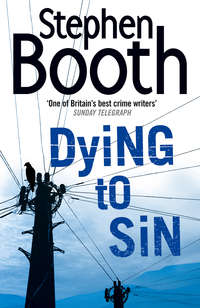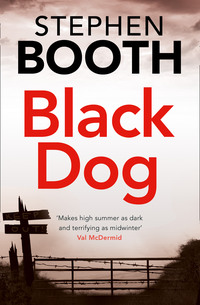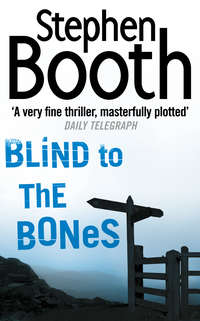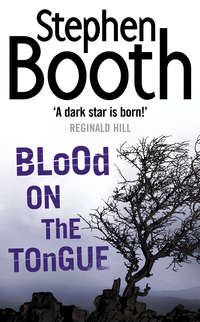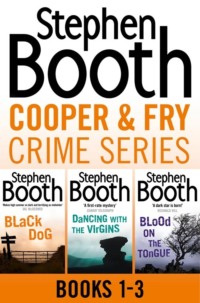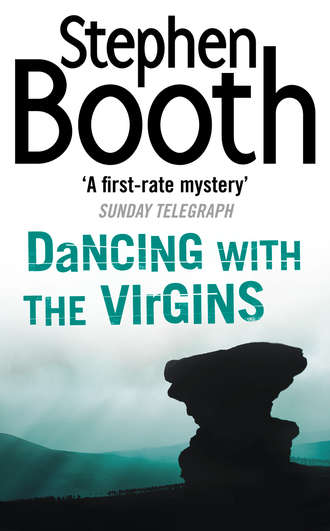
Полная версия
Dancing With the Virgins
‘This is just an introductory meeting,’ she said. ‘I’ll come back to talk to you again tomorrow, Maggie. If that’s all right with you.’
‘If you must.’
‘It’s very important now.’
‘Ah.’ Maggie hesitated. ‘Does that mean you have another victim?’
‘Yes, Maggie. And it’s vital we catch this man before he kills again.’
Maggie stared at Diane Fry out of her good eye, assessing her sharply, staring with the unblinking curiosity of someone who rarely saw a new visitor.
‘Kills?’
‘Yes, it’s murder this time. This victim died.’
Fry watched for a reaction. The trembling in Maggie’s hands and the draining of the colour from her face gave Fry a small measure of satisfaction.
‘We also want to put you on a witness protection programme. You know what that means?’
‘Of course. Remember I’m a lawyer.’
‘We’ll ask you to consider finding somewhere else to stay, if possible, Maggie, until we think it’s safe. In the meantime, a technician will call to install alarms in your apartment. You’ll be given a phone number you can call at any time.’
Maggie took a moment to recover her composure. ‘Is all that necessary?’
‘Maggie, we’re looking for a killer now. And you’re the only person who can identify him.’
‘I won’t go away. I’m staying here.’
‘But the other precautions …’ said Fry.
‘All right. But there’s one condition.’
‘Yes?’
‘If you’re going to visit me, do not feel sorry for me. I won’t talk to anyone who shows even the slightest sign of feeling sorry for me. Do you understand?’
‘Of course.’
Diane Fry was glad when Maggie Crew turned away. Since she had met Maggie at the door of her apartment, it had taken her several minutes to settle down, to recover from the initial shock. The sight of her had made Fry’s stomach muscles clench with vicarious pain as she tried to control her expression. But this woman must be used to such reactions by now.
Maggie Crew’s face would never be the same again. The knife had sliced her apart. No plastic surgery could ever completely hide the long, ragged scar that mutilated her cheekbone, splitting her face into two halves like a zip, its raised lips still red and angry, the flesh stretched painfully tight. No surgeon would ever entirely smooth out the ridges of shredded and bruised skin that puckered the corner of her right eye, pulling down her bottom lid to expose the pink veins, and twisting the whole side of her face into a leer.
But there was more even than that. There was the psychological damage that had been done to Maggie Crew. Even to Diane Fry the damage was obvious, though she had never met the woman before. Maggie was a partner in a firm of solicitors in Matlock. She was a successful professional woman, used to feeling self-confident and sure of her own worth. But now she had lost that confidence; her image of herself had been ravaged, slashed to pieces by the knife that had torn her face.
Fry knew that the attack on Maggie had happened six weeks ago. As far as they could ascertain, she had been attacked somewhere near the Cat Stones, the line of rocks below the Hammond Tower, not half a mile from where Jenny Weston’s body had been found. Maggie had been the lucky one. She had managed to stagger halfway off the moor before she collapsed from shock and loss of blood in the shelter of a wall, where she had been found by a farmer’s wife next morning. The doctors said Maggie had been lucky, in that the knife had narrowly missed removing an eye. Fry hoped that nobody had tried telling Maggie herself that she was lucky.
Now Maggie was recovering at home. And that meant she had been sitting here, in this sparse room, hiding from the light.
‘I suppose I should be frightened,’ said Maggie.
‘We’re just taking precautions. No need to be frightened.’
‘It would make a change – a change from finding people are frightened of me. They don’t know how to react, most of them. They don’t know what to say. They don’t want to talk about my face. Do you want to talk about it? About what my injury means to me.’
Fry shrugged. ‘Not particularly.’
Maggie looked surprised. Disappointed?
‘They say plastic surgery might help. But not yet. The injury is too recent.’
‘Yes, it takes time.’
‘Oh, the body heals itself to a certain extent, in time. The blood clots, the wounds close over, fresh skin grows. They can do wonders with surgery, they keep telling me. But it’s never quite the same, is it? You can’t rebuild the original tissue, and your body remembers the injury. You’re always marked in some way.’
The file said that Maggie Crew had received the appropriate counselling. She had gone through all the consultations with a psychiatrist. She had been encouraged to write down her feelings, to talk to Victim Support. The police had treated her with kid gloves for a time. But at the end of the day, they weren’t getting what they wanted. Maggie Crew knew far more than she had told them. She had seen her assailant and survived. He was the same man, they now suspected, who had killed Jenny Weston. It was at this moment, more than ever, that they needed the information locked in Maggie’s head.
Fry wondered how secure the apartment was. It occupied part of the second floor of Derwent Court, a converted spa hotel, a relic of the town’s Victorian past as a health resort. The building had stood derelict for years before an influx of county council office workers had boosted the demand for housing in Matlock. Now comfortably-off residents lived at the end of its marble corridors and stared all day at an expensive view over the Derwent Valley, counting the cable cars as they ferried tourists to the Heights of Abraham.
At least there was a concierge in the lobby downstairs. She would have to have a word with him before she left – he would be able to keep an extra careful eye out for visitors to Derwent Court.
She stared out of the window into the darkness. The quarry-blasted hillside stood out white and stark on the skyline to the south. No attempt had been made to repair or disguise the damage that had been done to the landscape by the mineral companies. The scars had been left as a symbolic reminder, a legacy of the past. And perhaps as a warning too. A warning of what might easily happen again one day – if no one did anything to prevent it.
‘Yes, some things take time,’ said Maggie. ‘Other things take a miracle.’
Ben Cooper had already formed a clear idea in his mind of what Jenny Weston had been like. There had been no shortage of details there, for once. The entry in the log at the cycle hire centre had given them the basics. Not only that, but the cycle hire manager knew which car was hers. Once they had got access to it, they had found her handbag in the glove compartment, with her diary and all the information they could possibly want, written on the front page in her own hand. It listed not only the name, address and phone number of her next of kin, but also Jenny’s date of birth, her National Insurance number, the numbers of her bank account and her mobile phone, the names of her doctor, dentist and vet, her religion, the address of her insurance company, her National Trust membership number, her height and weight, and her shoe size. And her blood group.
And then her father, Eric Weston, had lost no time arriving from his home at Alfreton as soon as they contacted him. Cooper had arrived back at Partridge Cross from Ringham Edge Farm just in time to sit in on the interview with DCI Tailby. Mr Weston had been all too willing to tell them about his daughter. He recited the details eagerly, as if he needed to remind himself, too, of who Jenny was. Of who she had been.
Jenny had been married at twenty-one. Her husband, Martin Stafford, had not been liked by her parents. Police officers heard that one often, of course. Very few parents thought the men their daughters chose were good enough. But in this case, Stafford had lasted about three and a half years before his violent nature became obvious. Jenny had stayed with him another two years before they had finally parted.
The story was a familiar one. A woman abused, yet reluctant to believe that there wasn’t something worth preserving in her marriage; convinced, somehow, that her man did what he did because he loved her. It seemed incredible to Cooper that some women continued to expect far too much of marriage. Their beliefs died hard.
Mr Weston was deputy head teacher of one of the Eden Valley secondary schools. He had that rather weary and worn look that identified middle-aged teachers. His hair was mostly on the back of his head, curly and untidy, and not trimmed on his neck for a long time. He wore a grey suit, but there were shiny patches on the trousers and an indefinable scent that reminded Cooper of his own school days. Chalk and musty text books, school dinners and badly washed schoolboys.
It seemed that Mr Weston was inclined to blame Martin Stafford for Jenny’s death. This was despite the fact that, as far as he was aware, the two of them hadn’t seen each other for three years.
‘It would be just like him to have got in touch again, and for Jenny to agree to meet him, without telling us,’ he said.
‘Do you know where Mr Stafford lives now?’ asked Tailby.
‘No, I don’t. I think Jenny knew. But she never told us that, either.’
‘Why?’
‘She thought we would interfere. We were so worried about her. She never seemed to see sense where that man was concerned.’
‘There are no children from the marriage?’
‘No.’
‘That’s fortunate, I suppose?’
‘I’m not sure about that,’ said Mr Weston.
Jenny had met Stafford while she was a student at the University of Derby. He had been a journalist then, working at the city’s Evening Telegraph – a senior reporter with a flair for off-beat features, or so he had said. According to Mr Weston, Stafford had cultivated a knowing, cynical image, had drunk too much and had cared about little except himself and his career.
‘Jenny was studying to be a radiologist,’ he said. ‘She was already in the third year of her course, and doing really well. She could have had a good career ahead of her, if it hadn’t been for Stafford. She met him in a pub in Derby, and he made a beeline for her. She was an attractive girl. And far too trusting.’
‘What happened?’
‘She became completely besotted with him. She wouldn’t listen to us when we told her to put her studies first, that her own career was more important. In the end, she gave up her studies to marry Stafford when he asked her to. She said she wanted to start a family with him. We had to accept it.’
‘But you said there were no children?’
‘No children. Only divorce.’
Even the divorce had come only after a series of short-lived reconciliations which were, according to Jenny’s father, simply Martin Stafford’s demonstrations of his ability to manipulate their daughter. He had some inexplicable power over her, and he was reluctant to give it up. The situation dragged on for a long time, painfully and unsatisfactorily.
‘When it was all over, Jenny managed to get a job with Global Assurance in Derby,’ said Mr Weston. ‘But then she had to move to their new call centre when it was built in Sheffield. We didn’t like it. It meant she was away from us, away from her family. She went to live alone in that little terraced house off the Ecclesall Road. It was too far away. All she had with her was her blessed cat, not even a dog. Her mother was very upset. She worried about what might happen to her. We both did.’
‘You were worried that Mr Stafford might try to get back in touch with her?’
‘Yes, of course. And that we wouldn’t know about it. Anything could have happened.’
‘But it didn’t.’
‘Well … not so far as we know.’
Mr Weston tried to recall a quick succession of boyfriends after Jenny had moved to Sheffield. All of them, he was sure, were men who were completely wrong for her. To Ben Cooper, Jenny sounded as though she had gone through those men like a woman looking for something she would never find, a woman whose better judgement had been cast aside. For what? A kind of penance? At one point, there had been an abortion. Jenny had not told her father at the time. His wife had told him about it, much later.
‘That was something I could never understand,’ he said. He shook his head, and Cooper saw the glitter of tears in the teacher’s eyes. ‘I never will understand it. Jenny always wanted children.’
And Jenny had hated her job, too. She had been good at it, had been promoted to supervisor, with twenty-five girls working for her. She had responsibilities and a better salary; she was well regarded by her employers and liked by her colleagues. But she had hated it.
‘She said it was a sweatshop. She really disliked that. She kept talking about the pressure, unattainable targets, the constant surveillance by managers to make sure you were always working, the tedium, the repetitiveness, the strain of being polite all the time to customers who didn’t want to speak to you. Oh, and the posters round the walls. They all said: “Smile”.’
Jenny had also been depressed by the rate of burn-out among her staff – even the best of them lasting little more than twelve months in the job. Many sacrificed themselves, as Jenny saw it, to marriage and to raising a family, purely as a means of escape.
‘She didn’t even manage to make any proper friends. She said animals were preferable to people. It might have helped a lot if she could have made friends. But Jenny said she barely had a chance to get to know any of her colleagues before they were gone. All the new recruits to these call centres now are youngsters, straight from school into their induction training, pulling on their telephone headsets and believing that’s what work is all about. In my position, I see them leaving school, full of hope, and I know what will happen to them. We do our best with them, you know, but that’s how a lot of them end up. Very sad.’
‘Did Jenny talk of escaping from the job?’ asked Tailby.
‘Oh yes. All the time.’
Of course she had talked of escaping; everyone did. She talked of working with animals, of being a veterinary nurse or running a wildlife sanctuary. But there was nothing she was qualified to do, and nowhere else she could go. Now and then she thought about her lost career as a radiologist. And those were the worst times, said Eric Weston. It was knowing it was too late that depressed her the most.
‘The one thing that Jenny really loved was the Peak District,’ said Mr Weston. ‘We used to bring her here as a child at weekends and in the summer holidays. Days out in Dovedale and at Castleton. When she went to university she joined a student walking club and they hiked over all the hills in the area. They did the whole of the Pennine Way one summer, staying at youth hostels. It was where she always came back to.’
Later, after her divorce, Jenny had again spent as much time as she could in the Peak District, walking, but often alone, since friends didn’t seem to last long. She had tried pony trekking a few times, said Mr Weston. But recently she had taken to mountain biking. She had her own bike at home, but had preferred to hire a bike from Peak Cycle Hire or from one of the Derbyshire County Council hire centres. Often she rode the trails created from the old railway lines. But at times, when she felt the need, she would leave the trails and set off on to the moors.
‘Yes, Ringham Moor was one of her favourite places,’ said Mr Weston. ‘We went there once as a family, many years ago. Jenny and John – that’s her brother – and Susan and me, a happy family together.’
And Mr Weston added that he thought, perhaps, Jenny might have been trying to recapture happy memories, a happiness that had escaped her in other ways. He didn’t know what had prompted her to take to the moors on that particular day. He didn’t know why she had headed for Ringham. He had no more answers to give.
Ben Cooper had walked away from the interview dissatisfied. Jenny Weston had not been anyone out of the ordinary. She had achieved nothing exceptional, and nothing extraordinary had happened to her during her lifetime. Could she really just have been another woman who had made all the wrong choices? If so, Jenny had been making the wrong choices right up until the moment she died. And one of those choices had been fatal.
6
The kitchen was the room the Coopers used most at Bridge End Farm. It had that familiar lived-in look which was inevitable with six people in the house, two of them children. Though Ben Cooper still lived at the farm, he had begun to find himself spending less and less time in the company of his brother and his family. He wasn’t sure why this was, when his mother was still upstairs and in need of his support.
Matt had already been driven indoors by the darkness that was steadily drawing in now. He sat at the kitchen table with Farmers Weekly, reading articles predicting more gloom for the farming industry. In the sitting room, Matt’s wife Kate and their daughters were watching cartoons on the TV.
‘We’ll be visiting Dad’s grave next week,’ said Cooper. ‘It’s the anniversary.’
‘As if I would forget,’ said Matt.
Matt turned the page of his magazine, but he no longer seemed to be focusing on the words. ‘Don’t say anything to Mum,’ he said. ‘You know it only upsets her. Now she’s stable, it would be nice if we could keep it like that for a while, rather than causing another episode like the last one. It’s not fair on the girls.’
‘We can’t just say nothing,’ said Cooper. ‘She’d be devastated if she knew we’d been to the cemetery without her.’
‘But if she really hasn’t remembered? Do we risk starting her off again? She’s been doing so well recently. It could set her back months, going over it all again, just because it’s the anniversary. It would be a kindness to let her forget.’
‘I don’t think it’s honest,’ said Cooper.
‘Some things are best not remembered. With luck, her memory will let her down.’
‘So schizophrenia can be a blessing. That’s nice to know.’
‘I didn’t mean that, and you know it.’ Matt put down the Farmers Weekly wearily and rubbed his face. ‘I’m sorry. It’s just –’ He shrugged. ‘There’s no end to it, is there?’
The brothers didn’t need to say any more to each other. It had all been said before, many times.
Kate looked in from the sitting room, releasing a burst of cartoon noise as she opened the door. Matt picked up his magazine again. Cooper had a book on the shelf that he was halfway through reading – Captain Corelli’s Mandolin. He always seemed to be years behind what everybody else was talking about. There was so little time to read. And often, like now, he couldn’t concentrate on what was in front of him.
‘Matt, do you know a farmer called Warren Leach?’
‘Leach? Leach … Where does he farm?’
‘Ringham Edge.’
Matt frowned over his pages. ‘I’ve heard of him. I don’t think I’ve ever met him to speak to. Dark-haired bloke, miserable sort?’
‘That sounds like him.’
‘What’s he done?’
‘Nothing that I know of. I just came across him on an enquiry.’
‘Ringham Edge. Small dairy herd, is it? And a lot of marginal land?’
‘Yes.’
Matt nodded and went back to his magazine. He turned a page, but found nothing he liked any better.
‘You know, some of them are in deep trouble,’ he said.
‘Who?’
‘Farmers like Leach at Ringham Edge. Small-scale livestock farmers, with no chance of diversification. But he’s only one of many, of course.’
‘Things looked pretty depressing up there, I must admit.’
‘It’s all pretty depressing. All of it.’
‘Come on, Matt. It’s not that bad.’
‘Yes, it is. It’s all gone to hell. I can’t see the time when farming will ever be the same again. Not around here, anyway. All the small farmers are going out of business. It’s too much for them. Far too much.’
‘Have you heard anything specific about Leach?’
Matt shook his head firmly. ‘I said I’ve seen him, that’s all. I don’t actually know him.’
‘But I expect you might know people who do.’
‘I expect I might,’ said Matt.
‘There could be rumours about him. Farmers talk to each other, don’t they? Down at the mart.’
Matt’s face set into stubborn lines. ‘Are you asking me to find out things about this bloke Leach?’
‘Just … I wondered if you might hear anything, you know. If you did …’
‘Sorry, Ben.’
‘What?’
‘I mean, no, I won’t do it. I don’t much like being asked to be some sort of secret policeman. I don’t like being asked to be a policeman at all, come to that. You’re welcome to that job.’
Kate stood in the doorway. She frowned at Ben and shook her head, scenting an argument between the brothers. She said arguments upset the children. And she was right to be protective – there had been enough disruption in their young lives.
So Ben Cooper said nothing, just nursed his thoughts to himself. He and Matt had never talked about their father properly. Not ever, in the whole of their lives. And when he died, it was too late to start. Yet Cooper longed to know what his brother felt; he wanted to be able to tell him what his own feelings were, how much he had come to resent the memory of their father, and how much that resentment hurt because it was such a contradiction to the way he had viewed him when he was alive. He felt as though he was trampling a fallen idol.
But he suspected that their father still was an idol, of a kind, for Matt. And it was the police that Matt blamed for their father’s death.
Matt could have found out about Warren Leach, if he wanted to. He was right, of course – there were many farmers in trouble. There were farms left standing empty all around the Peak District now. At first, they had been snapped up by wealthy incomers, people who boasted of having ‘a country house with a big garden’, and thought it was a huge joke. Worst of all were the people who played at farming, filling a paddock with rare breeds of sheep, a Vietnamese pot-bellied pig, a donkey and a goat. They drove the real farmers to apoplexy.
And already buyers were getting choosier. Some of the older, more run-down farms that were coming on the market stayed unsold for many months. New owners could no longer rely on selling the land that went with them to provide the capital for work on the house. Neighbouring farmers didn’t want the land – they couldn’t afford it. And if it was difficult land, the high hill land, it was useless to them anyway. All they could keep on it were a few sheep, which themselves were worth next to nothing.
Cooper went upstairs and looked in at his mother’s bedroom. She was sleeping, and her face was peaceful. He could always tell from her face the state of her mind; the turmoil in her brain was reflected in the contortions of her expression, even in her sleep.
Satisfied, he got washed and changed and went back down to the kitchen. The girls, Amy and Josie, had joined their parents at the table, and the room was full of noise and life. Cooper waved goodbye and walked down the passage to the back door.
For a moment, he stood and looked at the farm. The outline of the buildings became clear as his eyes adjusted to the darkness. He could hear the cattle moving quietly, one of the dogs snuffling in the yard, a pheasant cackling, startled by some predator perhaps. Beyond the barn, the dark bulk of the hill came slowly into focus, its crown bare against the sky, but its middle faintly ragged, where the tree line followed the contours of the valley.
Most of the fields down here at Bridge End were good, rich land. They had inherited the farm from their maternal grandfather, who had died at some vast age, still tottering about the place in his ancient shiny black suit and his army boots, with baling twine tied round his trouser bottoms. Officially, the farm had passed to their mother, and still belonged to her. But Matt had been the one to run it, right from the beginning, when he was barely a year or two out of agricultural college and working as a cowman on a big tenanted farm at Rowsley.


